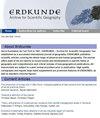对失落之地的定义
IF 1.1
4区 社会学
Q3 GEOGRAPHY
引用次数: 0
摘要
长期以来,将规范秩序和异端秩序并置的地方一直是地理学研究的领域。本文关注的是被理解为规范之外的无序场所的废弃建筑结构。尽管研究方向多种多样,但这些地方仍然缺乏统一的术语和定义。根据学术文献,以及公众的看法,我们将这些地方称为“失落的地方”。基于深入的文献研究和四年的实证实地调查,我们提出了丢失地点起源的主要轨迹和驱动因素。我们通过不同的挪用过程,确定了建筑结构功能丧失及其重新语境化过程中失去位置的根源的关键因素。这两个元素都将这些建筑结构描绘成多时间和多模式的重写本。最后,我们提出了一个过渡概念,为研究失落的地方提供了认识论基础。本文章由计算机程序翻译,如有差异,请以英文原文为准。
Towards a definition of lost places
Places juxtaposing normative and heterodox orders have long been a terrain for geographic research. This paper focuses on derelict architectonical structures understood as disordered places outside the norm. Despite the variety of research directions, there is still a lack of a uniform terminology and definition of these places. Following the academic literature, but also the public perception, we term those places as ‘lost places’. Based on an intensive literature research and a four-year empirical fieldwork, we present main trajectories and driving agents on the origin of lost places. We identify the key elements of the origin of lost places in the loss of functionality of architectonical structures and their re-contextualization through different appropriation processes. Both elements portray these architectonical structures as multitemporal and multimodal palimpsests. Finally, we propose a transition concept that offers the epistemological basis for studying lost places.
求助全文
通过发布文献求助,成功后即可免费获取论文全文。
去求助
来源期刊

Erdkunde
地学-自然地理
CiteScore
2.00
自引率
7.10%
发文量
17
审稿时长
>12 weeks
期刊介绍:
Since foundation by Carl Troll in 1947, ''ERDKUNDE – Archive for Scientific Geography'' has established as a successful international journal of geography. ERDKUNDE publishes scientific articles covering the whole range of physical and human geography. The journal offers state of the art reports on recent trends and developments in specific fields of geography and comprehensive and critical reviews of new geographical publications. All manuscripts are subject to a peer-review procedure prior to publication. High quality cartography and regular large sized supplements are prominent features of ERDKUNDE, as well as standard coloured figures.
 求助内容:
求助内容: 应助结果提醒方式:
应助结果提醒方式:


